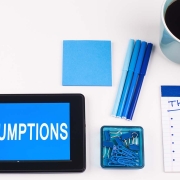Relationship Issues Stressing You Out? 3 Tips to Improve Marriage Problems Without a Marriage Counselor
“Why do I NEED to consider her point of view after all the marriage problems we’ve had, and the way she’s treated me?”
A divorce mediation client angrily asked this of me after I made a comment suggesting the possibility that he might need to consider his wife’s perspective.
I was trying to suggest that it might be helpful to understand what she was saying by looking at the situation through her eyes. After all, stepping in to someone else’s shoes is a common approach to improving communication in relationships. Well, the word “need” really set him off!
In hindsight it was clearly a poor word choice by me.
After a moment’s reflection I told him that I was wrong to use the word “need” and that in fact he did not “need” to do anything that he did not want to do. This calmed him down.
To his surprise I followed up by asking him what the harm would be in considering her point of view.
Now it was his turn to take a moment to reflect. To his credit he tried to consider her perspective.
Your Laziness Might Be Creating Your Marriage Problems…and Creating Business for Your Local Marriage Counselor!
I learned an important lesson from this exchange.
I had developed a very comfortable rapport with this client (we had met several times already). My comfort led to a lazy statement that made him defensive.
Similarly, couples get comfortable with one another. Over time, their internal censor diminishes and they sometimes talk before thinking. Their message may be rough around the edges, their partner bristles, and the stressful relationship issues rear their ugly heads.
Don’t we get lazy in the way we communicate all the time in our relationships at home?
Want to Stay Out of the Marriage Counselor’s Office? Package the Message Properly and Your Marriage Problems and Relationship Issues WILL Improve
My client was not adverse to considering an alternative viewpoint – even if it was his wife’s – but he was surely not going to do it because he was told to do so. When he did not feel forced or directed, he found that being able to step in to her shoes for a moment helped him work through the current impasse.
Ultimately, how we go about saying something is often more important than what it is we have to say. It is all about the packaging of the message!
Lazy communication is like crumpled gift-wrapping — it sends the wrong message.
Three Strategies For Improving Your Communication Packaging
1. Tell your partner what you think and feel, NOT what they should think and feel. “I” statements are far more effective than “you” statements.
2. Think about what you want to say before you say it. Just because you are talking to someone you love does not mean they don’t deserve the same sensitivity you would show an employer or member of the clergy! They do.
3. If you are angry or frustrated — heated in any way — wait. Wait until you are calm. Wait until you have had time to think it through.
I have found that the way I frame messages in my work as a mediator, and in my life as a husband, son, and father makes or breaks a difficult conversation.
What additional tips on how to package messages productively can you share with other readers? What other communication strategies can help improve marriage problems?










